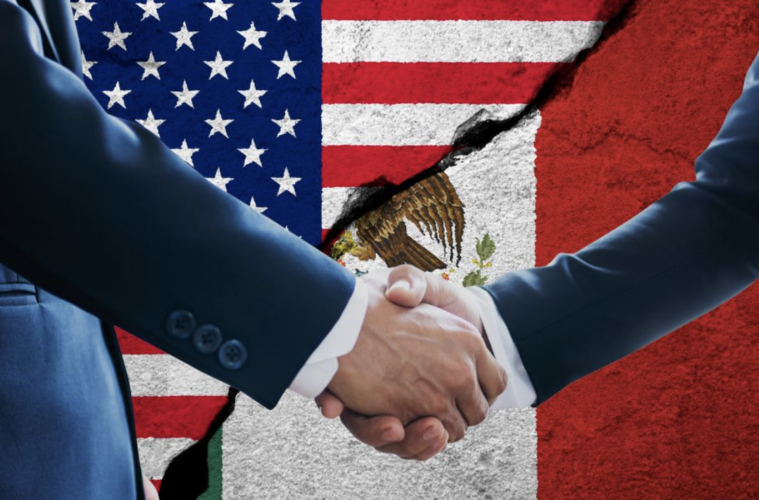In an American Community Media briefing, experts highlighted how Mexico’s President Claudia Sheinbaum is navigating a complex relationship with U.S. President Donald Trump — not by confrontation or capitulation, but by maintaining what panelists called a “cool head,” strategic diplomacy, and economic pragmatism.
Throughout the discussion, scholars and political analysts emphasized that Sheinbaum’s approach reflects a sophisticated understanding of power dynamics — showing how a calm and steady style of leadership can influence even the most unpredictable political climates.
“Three presidents in a row have chosen a path of trying to appease this threat in order to maintain foreign investment flows and the value of the peso,” explained David Ayón, Senior Fellow at Loyola Marymount University’s Leavy Center for the Study of Los Angeles.
“Mexico has offered Trump something of great value — the normalization of his image.”
Ayón noted that this diplomatic strategy dates back to former President Enrique Peña Nieto, who invited Trump to Mexico during his 2016 campaign, a move Ayón characterized as appeasement that helped to stabilize U.S.-Mexico relations even before Trump’s first election. This path was continued by Andrés Manuel López Obrador and is now maintained by Sheinbaum.
The “Third Way” of Diplomacy
Rather than challenging or capitulating to Trump’s often aggressive tactics — labeled by many as “coercive diplomacy” — Sheinbaum has chosen a “third way” that focuses on mutual stability, engagement, and economic continuity.
“My best guess is that she has probably conveyed to Trump that both of them — Mexico and the United States — have invested heavily in maintaining stability in the relationship,” said Ayón.
“She understands the value of that continuity, especially for Mexico’s economic interests.”
Luis Alvarado, a political analyst based in Los Angeles and former Republican campaign operative, agreed that Sheinbaum’s approach reflects keen political instincts.
“Her team has been incredibly successful in anticipating what Donald Trump is going to do and not panicking over statements and actions,” said Alvarado.
“They have been very steady in the course and not reactionary.”
Alvarado emphasized that Sheinbaum’s strategy helps keep vital trade relationships intact while allowing Trump to maintain his domestic political narrative — a balancing act that has so far prevented major diplomatic fallout.
Economic Stakes Remain High
The experts pointed out that maintaining economic ties has been crucial. Mexico is now the United States’ number one trading partner, surpassing China, and many American businesses have deep investments in Mexican supply chains.
Alberto Díaz-Cayeros, professor at Stanford University’s Freeman Spogli Institute, noted that Mexico’s position within global supply chains has only strengthened in recent years, partly because of disruptions from the COVID-19 pandemic and U.S.-China tensions.
“Mexico seems to be getting lucky in the spheres of influence game,” Díaz-Cayeros said.
“It might end up having preferential tariff treatment that the rest of the world might not get.”
He also emphasized that President Sheinbaum brings her own formidable credentials to the table, beyond political alliances.
“She’s a scientist trained at Berkeley and was part of the Intergovernmental Panel on Climate Change team that won a Nobel Peace Prize,” Díaz-Cayeros explained.
“She has political skills that in many ways surpass those of her predecessors.”
Potential Risks Ahead
Despite the success so far, the panelists warned that the relationship is not without risks.
Ayón cautioned that economic uncertainties — particularly the possibility of a U.S. recession — could strain Mexico’s economy and challenge Sheinbaum’s plans for increased social spending.
“If the U.S. goes into recession, which is at least a 50-50 prospect right now, that will definitely have an impact on Mexico,” Ayón said.
Larry Rubin, President and Chairman of the Board of the American Society of Mexico, also stressed the importance of upcoming trade negotiations. He noted that while Mexico is largely shielded by the U.S.-Mexico-Canada Agreement (USMCA), full compliance with intellectual property protections and judicial independence will be key as the agreement comes up for review in 2026.
“Today, supply chains are very well integrated,” Rubin said. “Both countries need each other. President Trump understands that Mexico is crucial not just for trade, but for U.S. national security.”
Lessons in Leadership
Throughout the briefing, one theme emerged clearly:
In a time when global politics often rewards loud voices and hardline stances, Sheinbaum’s diplomacy-by-steady-hand is demonstrating that resilience, patience, and strategy remain powerful tools on the world stage.
As Díaz-Cayeros reflected, “It’s important to understand the quiet strength that’s being exercised. Sheinbaum’s leadership is showing that stability and pragmatism can be just as influential — if not more — than grandstanding.”

